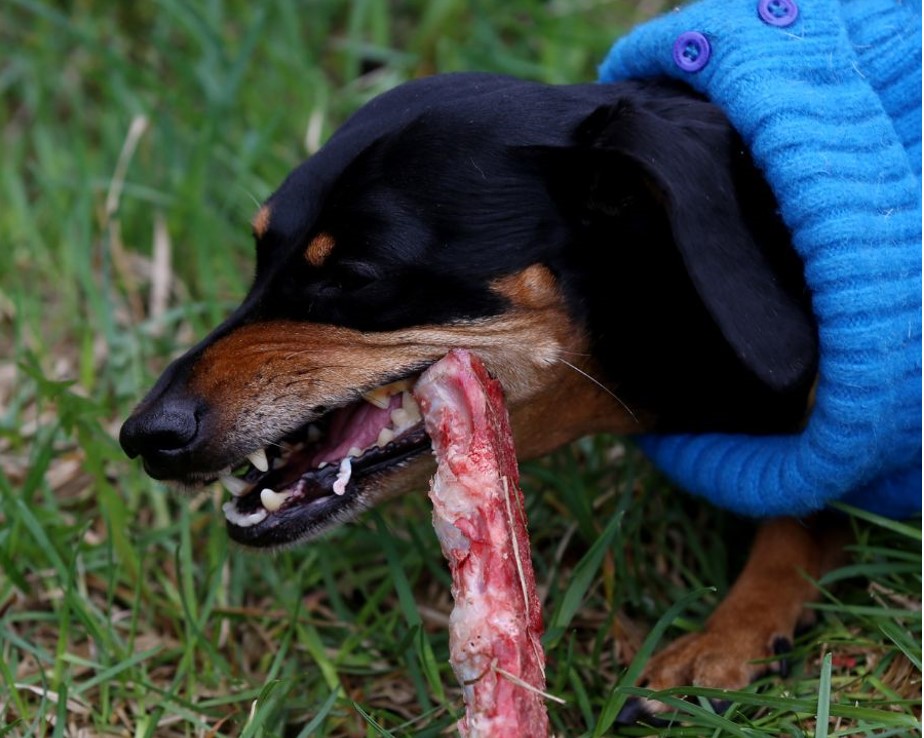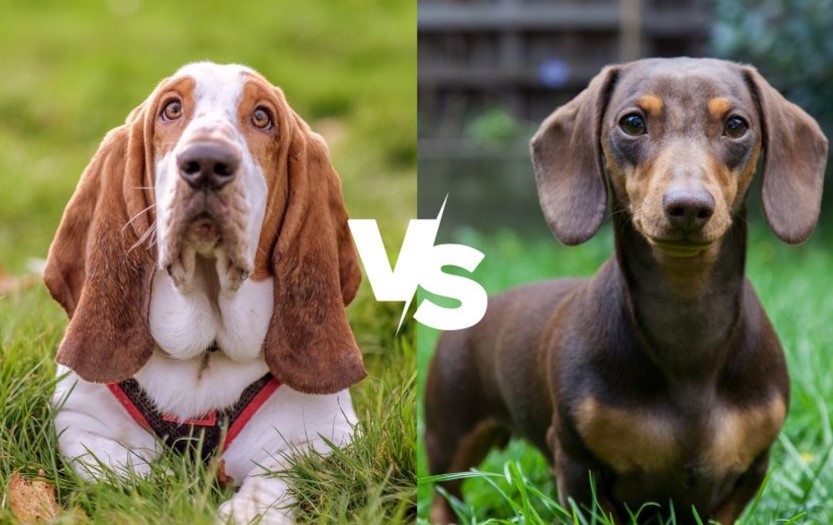Due to their remarkable resemblance, the Basset Hound vs. Dachshund are sometimes compared. The Dachshund, sometimes referred to as the wiener dog, badger dog, or sausage dog, is a short-legged, long-bodied hound-type dog breed.
The Basset Hound is a short-legged hound breed. The Basset is a ground-scenting scent hound originally bred for hare hunting.
The little Dachshund was created to hunt small mammals like rabbits, whereas the standard-sized Dachshund was developed to sniff, chase, and flush out badgers and other burrow-dwelling animals.
Both breeds are devoted and affectionate, and neither requires much exercise so that they can adapt to apartment living. Although both are intelligent, they are also renowned for being stubborn and sometimes challenging to train.
Basset Hound vs Dachshund – What is the Best Breed for You
Both breeds have been able to thrive among people for many years while surviving. Both are now common pets and have been bred for their superior hunting abilities. So how do you know that? What is the best breed for you?
To choose the breed that is most suited to your lifestyle and living situation, it is essential to constantly do your research before deciding on what breed to obtain.
To help you decide which breed best suits you, here is an in-depth comparison of the Basset Hound and the Dachshund.
Basset Hound vs Dachshund – Origin
One of the six “basset”-type breeds officially recognized in France is the basset hound. The French term “bas,” which means “low,” and the attenuating suffix-et, which together indicates “relatively low,” are the origins of the word Basset. Basset Hounds were originally bred in France and Belgium.
The Dachshund has two sizes: standard and miniature, and was developed in Germany more than 300 years ago to hunt badgers. The word Dachshund is indeed a German word as the breed originated from Germany.
Dachshund vs Basset Hound Other Names
The Hush Puppy and Basset are different names for the Basset Hound. Bassotto, Sausage Dog, Tekkel, Tekkel Doxie, Weenie Dog, Worshond, and Teckel are alternative names for dachshunds.
Dachshund vs Basset Hound Accessibility
You can buy them from professional breeders or adopt them from any rescue organization. They are both bred frequently and are both easily accessible.
Dachshund vs Basset Hound Price
Although a Basset Hound puppy costs between $300 and $500, a Dachshund puppy ranges from $300 to $700.
Dachshund vs Basset Hound Weight
| The Standard Dachshund is 16 to 32 lbs. (7 to 15 kg) The Standard Dachshund weight is 24 lbs. (11 kg) |
| The Miniature Dachshund is 12 lbs. (5.5 kg) The Miniature Dachshund’s weight is 12 lbs. (5.5 kg) |
| The Toys Dachshund are 8–11 lbs. (3.5 to 5.0 kg) Toy Dachshund’s weight is 9.5 lbs. (3.5to 5.0 kg) |
| Basset Hound Female is 45 to 60 lbs. (20 to 27 kg) Basset Hound Female: 52.5 lbs. (23.5 kg) |
| Basset Hound Male is 50 to 65 lbs. (23 to 29 kg) Basset Hound Male: 57.5 lbs. (26 kg) |
Dachshund vs Basset Hound Height
| Standard Dachshund Height: 8 to 11 inches (20 to 27 cm) Standard Dachshund Height: 9.5 inches (23.5 cm) |
| Miniature Dachshund Height: 5 to 7 inches (13 to 18 cm) Miniature Dachshund Height: 6 inches (15.5 cm) |
| Toy Dachshund Height: 12 inches (30 cm) Toy Dachshund Height: 12 inches long (30 cm) |
| Basset Hound Female: 11 to 14 inches (28 to 36 cm) Female Basset Hound: 12.5 inches (32 cm) |
| Basset Hound Male: 12 to 15 inches (30 to 38 cm) Male Basset Hound: 13.5 inches (34 cm) |
Dachshund vs Basset Hound Coat Type
There are three different coat types that Dachshunds can have: smooth, long, and wirehaired. Smooth-coated Dachshunds have short, shiny coats that shed very little.
Dachshunds with wirehair again have two coats; the undercoat is soft and fluffy, whereas the top layer of hair is short and wiry.
The short, hard-textured, smooth coats of Basset Hounds are generally simple to maintain. However, in conclusion, Basset Hounds have a denser coat than Dachshunds.
Dachshund vs Basset Hound Colors
Dachshunds come in various colors, including Tan, Brown, Silver, Blue, Red, White, and Black. In contrast, Basset Hounds come in Brown, Red, White, Black, Tricolor, Tan, and Gray.

Dachshund vs Basset Hound Grooming
There isn’t much grooming required for the Dachshund and Basset Hound. A skilled groomer doesn’t need to trim the dog’s hair; only a seasonal flea treatment is required.
Regular cleaning of the ears and eyes is required to avoid infections. The Dachshund or Basset Hound is an excellent alternative if you don’t have the time, skills, or money to care for a high-maintenance dog.
Dachshund vs Basset Hound Shedding
Basset Hounds have an average shedding. Regular brushing helps to cut down on hair loss. It happens naturally as part of the hair growth cycle. It largely depends on the breed they are and how healthy they are.
Dachshunds rarely or never shed. If you get a puppy from this breed, you won’t have to worry about dog hair on your couch or in your car. Dachshunds might be the best option if you can’t stand dog hair. Although there are long-haired dachshunds, those are rarer.
Dachshund vs Basset Hound Bath Frequency
Dachshunds
3–4 weeks, more frequently than usual. Compared to short-haired breeds, these dogs’ coats tend to be longer, softer, and oilier.
While occasionally taking a nice bath is an excellent way to prevent your friend from getting extremely smelly, be careful not to over-bathe.
Your dog’s natural oils will be removed if you bathe them, but regular brushing should keep them clean.
Basset Hound
Usually 4-6 weeks. For this family dog, experts suggest at least every four to six weeks.
The research found that 60% of dog owners use the sniff test to determine when it’s time for a wash, and 56% of pet owners don’t give their pets baths as regularly as they should.
Bathing your dog has numerous advantages for them. Additionally, this is an excellent time to check for any strange pimples, scrapes, fleas, or other abnormalities.
These details are more apparent when their hair is wet and flat against their bodies.
Dachshund vs Basset Hound Behavior
Basset Hounds are Tempered, Devoted, Gentle, Tenacious, Affectionate, Friendly, and Sweet, while Dachshunds are Playful, Courageous, Lively, Stubborn, Clever, and Devoted.
The only time basset hounds truly get excited is when they are out hunting.
The Basset Hound is a pack animal and does not like to be alone. Nevertheless, they get along well with people and other animals (except if the other pet is small enough to be hunted).
Dachshunds are energetic and loyal. They tend to choose one person to love and protect since they are brave and self-assured. Your family will be welcome, but they will be apprehensive of strangers. However, they are playful and cheerful at home.
Dachshund vs Basset Hound Intelligence

One of the dog breeds with the lowest level of obedience and intelligence is the Basset Hound. If you want to impress others with these dog tricks and instructions, you must put in a lot of effort. They can comprehend and remember new commands after 80 to 100 repetitions so that they can obey the first command approximately 25% of the time.
Teaching Dachshunds any tricks or commands requires patience, but the effort is worth it. After an average of 25–40 repetitions, new orders are understood and remembered by dachshunds. The Dachshund is ranked average as having ordinary dog intelligence.
Dachshund vs Basset Hound Trainability
The Dachshund is simple to train. They soon learn the connection between orders and actions.
Training a Basset Hound is relatively simple. They can be difficult sometimes, but they will always obey if you are patient in teaching them new commands.
Dachshund vs Basset Hound Playfulness
Like all dog breeds, dachshunds like playing. Although they are not the most playful dog breeds, they occasionally bark excitedly when they want to play.
The dog breed known as Basset Hounds is not the most playful. While playing is occasionally enjoyable, it is not their preferred activity.
Dachshund vs Basset Hound Sensitivity
Compared to other dog breeds, these are a little bit more sensitive. Soft punishment has an emotional impact on these pooches.
Basset Hounds and Dachshunds do not accept an irregular daily schedule, noisy homes, or frequent visitor visits.
They make excellent family pets since they are sensitive to their owner’s feelings.
Dachshund vs Basset Hound Affection
Dachshunds and Basset Hounds both have a strong bond of loyalty to their owners and are affectionate and loving canines.
Despite the activity, they like spending time with their owners and are regarded as excellent therapy dogs for those in need.
Due to their deep bonds, these breeds overreact to their handler’s emotions. Their happiness depends on your happiness.
Dachshund vs Basset Hound Social Interaction
Being left alone is intolerable for Dachshunds.
Dachshunds are very social. They find joy in being around individuals or animals.
The social interaction requirements of Basset Hounds are average. This breed enjoys being near people and other animals, but they also don’t mind spending a few hours alone.
Dachshund vs Basset Hound Barking
Dachshunds are an especially loud breed. They frequently enjoy howling and barking aloud. They are not the best option if you want a quiet dog. Fear, attention, alarm, boredom, greeting, separation anxiety, compulsive barking, and defense are the main causes of barking.
Sometimes the Basset Hound will bark. Depending on their emotional state and what they’re trying to express, they can alter their bark.
The same bark could have multiple meanings or several meanings for the same bark. Protection, alarm, fear, boredom, attention-seeking, greeting, separation anxiety, and obsessive barking are the top causes of barking.
If you want to learn more about Corgi vs Dachshund, check out that article.
Dachshund vs Basset Hound as a Watchdog
The average watchdog is the Dachshund. Although they will let you know if they notice anything unusual, they do not consider observation as their primary responsibility.
If you want a good watchdog, Basset Hounds are not the ideal breed to choose. They won’t warn you if they notice something unusual because they aren’t territorial and protective of their stuff.
Dachshund vs Basset Hound as a Guard Dog
The Dachshund is a fair defender. Some dogs fiercely defend their territory, while others willingly allow a stranger to trespass. This breed is not always assured in its ability to protect its territory.
Basset hounds are unable to defend their territory. It is preferable to relieve them of guarding your property and assets.
Dachshund vs Basset Hound Biting
The Basset Hound and Dachshund are unlikely to bite someone. If they bite, it could usually result from protection, pain, excitement, the herding instinct, or being provoked.

The Dachshund’s biting force is approximately 100 to 200 PSI.
The biting force of a dachshund is considered weak. Dogs with bite forces of under 200 PSI which is the weakest. It’s crucial to remember that although their biting force is regarded as being the “weakest,” dog bites can still be extremely dangerous.
Generally speaking, they are extremely friendly and non-aggressive around kids and other animals.
The Basset Hounds’ biting force is approximately 200 to 400 PSI.
This biting force of a Basset Hound is average. Dogs typically bite with 200 to 400 PSI of power.
As a result of their powerful jaws, the Basset Hound and many other breeds can be frightening to be around, so it’s necessary to control them until they are appropriately trained.
However, they are often peaceful, make lovely friends, fit in well with families, and require little care.
Dachshund vs Basset Hound Apartment Friendliness
The Dachshund breed is suitable for apartments. It would be ideal to have a small garden where it could occasionally go outside to relieve itself, but this is not at all necessary.
He can get enough exercise from one or two daily walks to feel at home in an apartment.
The Basset Hound breed does not do well in apartments. Consider your choice carefully if you don’t have a garden, because keeping a Basset Hound indoors might lead to many issues.
Dachshund vs Basset Hound Loneliness
When a family member is around during the day or their business is dog-friendly, they may bring the dog to work, which Dachshunds enjoy.
Like any puppy, when left alone by its owner, Basset Hounds are likely to panic, whimper, bark, or whine. This problem can be solved with proper socialization and quality time spent with the dog.
Dachshund vs Basset Hound Stranger Friendliness
The least social of strangers’ dogs are dachshunds.
Basset Hounds are extremely stranger-friendly canines.
Additionally, the Dachshund is not the most kid-friendly breed of dog. If you have kids, you might want to think twice before getting a puppy from this breed.
Basset Hounds, on the other hand, are excellent kid-friendly pets.
To add to this, Dachshunds are not really dog-friendly. The Dachshund is not an intelligent choice if you want to expand your family with more dogs or if you want to attend dog gatherings.
Basset Hounds get along well with other dogs.
Dachshund vs Basset Hound Health Issues
Although they are both of a healthy breed, there are a few health concerns that you should routinely discuss with your veterinarian.
Dachshund vs Basset Hound Lifespan
| 11–15 years is the usual lifespan of Dachshunds and a 13-year average lifetime. |
| 10–12 years is the usual lifespan of Basset Hounds and an 11-year average lifetime. |
Dachshund vs Basset Hound Sleeping
Like an average dog, Dachshunds sleep 12 to 14 hours every day, although they are not regarded as lazy breed.
Basset Hounds sleep a lot because they enjoy it. An adult Basset Hound will sleep for 13 to 18 hours a day.
Final Thoughts
Dachshunds and Basset Hounds are both great breeds – whichever you choose, you’ll probably be happy.
We hope this quick overview of each breed was helpful to you and if you would like more information on Dachshunds, check out some of our other articles here at Dachshund Empire!

